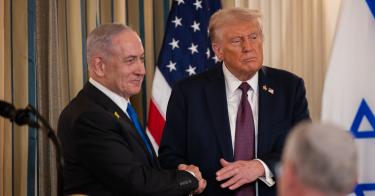The United Nations vote in favor of Palestinian statehood earlier this month was an opening act for this week’s conference, where France, Britain and a long list of other Western nations recognized a “state of Palestine.”
Each of these symbolic recognitions bolsters Hamas’ belief that it can win the war by waiting out Israel.
President Trump has invested a significant amount of his administration’s diplomatic time and effort trying to bring an end to the war in the Gaza Strip, but the diplomatic gambit hatched in European capitals means Washington will have to use bold new tactics, mirroring Paris’, to bring Hamas back to the bargaining table.
Hamas correctly hailed French President Emmanuel Macron’s announcement as vindication of its Oct. 7, 2023, massacre; after all, violence led to the realization of some of their political goals. Secretary of State Marco Rubio has repeatedly said that the “minute” France announced its recognition blitz, “Hamas walked away from the negotiation table.” Despite its contempt for international law in practice, Hamas attaches massive ideological importance to ideas of sovereignty and international recognition.
>>> Europe’s Reckless Recognition of Palestine Threatens the U.S.–Europe Alliance
To end the impasse caused by the recognition blitz, the Trump administration must respond in kind by threatening U.S. recognition of Israeli sovereignty in Judea and Samaria. Hamas knows that even if Mr. Trump allows Israel to “open the gates of hell,” it will only increase diplomatic blowback against the Jewish state. Any operation that does not result in the rescue of all the hostages allows Hamas to keep its greatest weapon.
An American recognition of Israeli sovereignty, on the other hand, will show Hamas that it may be losing the territory it seeks to conquer. Recognition is sticky; Mr. Trump’s bold first-term actions regarding Jerusalem and the Golan Heights were not reversed by President Biden despite significant pressure from the liberal flank. (Nor was Moroccan sovereignty in Western Sahara.) Moreover, the first major diplomatic recognition of Israeli sovereignty in the territory counts much more than the 150th recognition of a Palestinian state.
Reality-based policies have a stronger gravitational pull than those based on fantasies. The French and their followers are playing make-believe. This became clear when they denounced the planned construction of apartments in a Jerusalem suburb for allegedly preventing the creation of the state they claim already exists.
The legal case for recognition is strong. Judea and Samaria was part of Mandatory Palestine, which became Israel in 1948. When Jordan and its allies invaded to prevent the creation of a Jewish state, they occupied the territory, renamed it the West Bank and expelled the Jewish population. Still, such aggressive conquest does not redraw borders. These places have now been under Israeli control for nearly 60 years, and repeated offers of sovereignty to the Palestinians have been turned down.
>>> To Achieve Lasting Middle East Peace, We Must Expand the Abraham Accords
Mr. Trump had not planned to act on the Judea and Samaria issue now, but Mr. Macron and company have forced his hand. Palestinian terrorist factions are aware of Israel’s overwhelming military superiority. Their cause is kept alive by the belief that international pressure will break the Zionists, which is why they are so entranced with analogies to South Africa and French Algeria.
An American reaction is necessary to ensure the very survival of its key Middle Eastern ally. The long-term goal of recognition by U.N. Security Council permanent members France and Britain is to provide a basis for future resolutions imposing sanctions and boycotts on Israel, which a Democratic president may not veto, following the precedent of Barack Obama.
Mr. Trump considered recognizing Israeli sovereignty in his first term but chose to defer it to pursue the Abraham Accords. Now, to continue expanding the accords, he must end the war in Gaza, which requires new carrots and sticks. Just as the first-term recognition of Jerusalem and the Golan set the stage for the Abraham Accords, a recognition of Judea and Samaria will create the preconditions for their expansion.
To be sure, Arab states are threatening to walk back their relations with Israel if it applies its law fully to areas of Judea and Samaria. Still, if America legitimizes Israel’s move, Arab capitals will not seek conflict with Washington over a symbolic issue. In any case, Mr. Trump can rightly tell Arab states to address their complaints to Paris and London.
This piece originally appeared in The Washington Times




